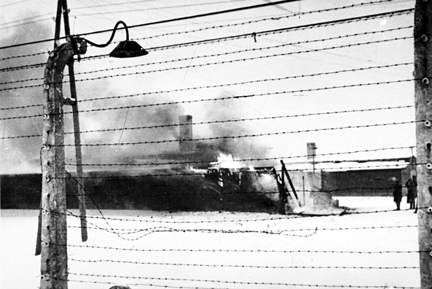Elie Wiesel Knows Soviet “Liberators” Destroyed the Birkenau Crematoriums
By Carolyn Yeager
The official Holocaust narrative versus Elie Wiesel on what is Auschwitz liberation day
The photograph above is a still photo from a Soviet propaganda film about the Auschwitz liberation. The clothing warehouses, known as “Canada,” are burning. But who set them on fire?
_______________________________________________
The official Holocaust narrative has it that the Red Army did not arrive at the Auschwitz labor camps until January 27th, 1945—where they found some of the barracks burning, and also blown-up crematorium buildings which had housed “gas chambers.” This is the date that is commemorated all over the world as the Liberation of Auschwitz.
However, on page 87 of the novel Night it is stated that the Russians “liberated” the inmates who were left behind at Monowitz (Auschwitz III) on January 20th, two days after the bulk of the prisoners left on the one-day forced march to Gleiwitz, from where they took a train to Buchenwald.
I included this detail in Night #1 and Night #2, Part Two under the heading “A record of fact it isn’t.” For the first time I’ve seen anywhere, I pointed out this paragraph from Elie Wiesel’s book Night:
A strange detail … is on page 87 of the original Night. Eliezer remarks, after his and his Father’s deliberations and final decision to go on the march: “I learned after the war the fate of those who had stayed behind in the hospital. They were quite simply liberated by the Russians two days after the evacuation.” The evacuation, as we all know, was on the 18th. We also know the Russians did not arrive on the 20th of January! The actual liberation day is January 27. What possessed Wiesel to write this? Well, because it was in Un di velt: “Two days after we had left Buna, the Red Army occupied the camp. All the sick had stayed alive.”
It’s important to keep in mind that the Jan. 20th liberation originally appeared in Un di velt hot geshvign, the Yiddish book published in 1955 from which La Nuit was born in 1958 (with the English version Night following in 1960). Whether or not Elie Wiesel is the author of the Yiddish book, there is no doubt that he wrote La Nuit directly from it. So he either wrote that sentence in Un di velt or he copied it from Un di velt for La Nuit. In any event, he has never rejected that sentence as a mistake, nor was it changed in Marion Wiesel’s 2006 translation … perhaps because it appears in the Yiddish Un di velt.
There's more! Continue reading at Elie Wiesel Cons The World
Category
Elie Wiesel, Holocaust Revisionism- 1215 reads










